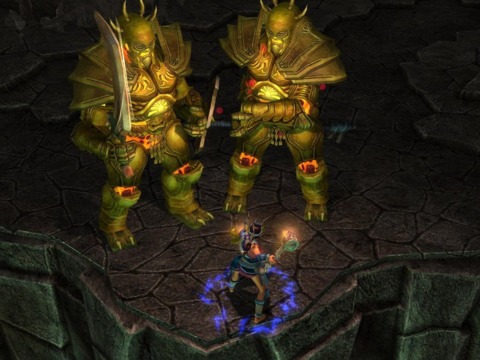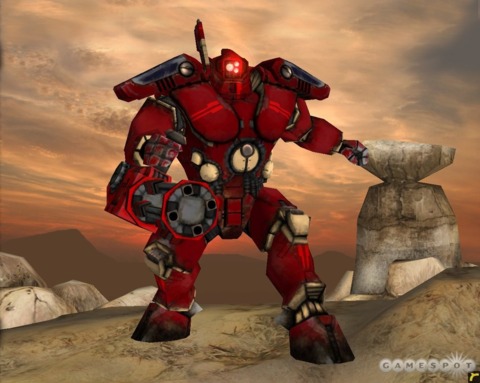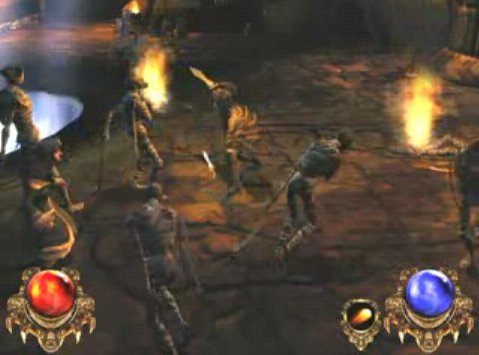Spot On: Studios bust as industry booms
The recent rash of independent-studio closures comes amid months of record-breaking retail sales; but what do billion-dollar revenues mean to someone who's lost their job?
Since January, a host of development studios have closed their doors, suspended operations, or otherwise stopped making games. Stormfront Studios, Perpetual Entertainment, Pseudo Interactive, Iron Lore Entertainment, and Castaway Entertainment have all hit the rocks in the last four months. Still-unconfirmed reports also have Activision's Foster City site, formerly Z-Axis, on the chopping block.
During that same period of time, the industry has racked up phenomenal sales. NPD's retail software-sales data for the US has been up by double-digit percentages for each of the first three months of the year, with growth of 47 percent and 63 percent in February and March, respectively. Meanwhile, Chart Track has reported its own record sales figures for the UK industry in the first quarter of the year.
All of this comes among heightened concerns of a recession in the US, highlighted by the collapse of securities firm Bear Stearns, record-high prices for crude oil, airline closures, and a depressed housing market. The gaming industry's stubborn refusal to stop making money hand over fist has led some industry analysts to portray gaming as a recession-resistant industry, with at least one going so far as to say that the industry can thrive on an economic downturn.
So how is the industry actually doing? If it's as great as the sales figures say, why isn't there enough money going around to keep independent studios in business? To get a fresh perspective, GameSpot bypassed the usual assortment of analysts and went straight to developers directly affected by closures to see if the situation looks any different from the inside.

IRON LORE: On the Razor's Edge
Travis Doggett was an artist at Iron Lore from late 2005 until the studio's closure in February. He started off the year by finishing up work on the Soulstorm expansion for THQ's Warhammer 40,000: Dawn of War expansion pack. In the period between the game going gold and shipping to stores, Iron Lore management informed the staff that the studio would be closing after failed attempts to secure a follow-up project.
It wasn't the first studio that Doggett had survived. His first job out of art school was a two-year stint working for the famously excessive Ion Storm Dallas to finish up the long-in-development PC role-playing game Anachronox. Work on the game had barely wrapped up when parent company Eidos rewarded the team for its hard work by closing the studio.
"When Ion Storm shut down, it was awful," Doggett said. "We just took a two-week vacation to celebrate shipping Anachronox, which was a five-year project. On the last day of vacation, I got a voicemail saying they were shutting down the studio. That vacation we just took turned out to be our remaining vacation days."
Doggett's next job was at Atari-owned Legend Entertainment, which closed a little more than two years after he started working there, its last game being the special-edition release of Unreal II. One lesson Doggett said that he learned from seeing the three separate studios go under is that game developers can go out of business a million different ways, and it isn't always accompanied by a greater meaning.
"I don't notice the current rash of closings as being particularly noteworthy," Doggett said. "I mean, if I had everything on a chart, maybe it would give me pause, but it seems like business as usual. Studios are closing all the time. And they're opening all the time. It's volatile, sure, but it feels consistent."
However, Doggett said believing that the timing of these studios' deaths is an unfortunate coincidence doesn't take the sting out of losing one's job.
"It always hurts," Doggett said. "I know what those poor bastards are going through... I know what they've been through, those developers that got shut down. I know what it means to pour your heart out on a project, work really hard on something you want to be proud of, do nothing wrong, and still end up out on the street when it's all wrapped up."
As rough as it might be to wind up unemployed through no fault of one's own, it might be worse to have managed a dying studio and to know that its fate could have been avoided with a few different choices. Iron Lore's former president Jeff Goodsill never wanted to tell his staff that they were all out of work after Soulstorm was finished.
"It's very painful," Goodsill said. "You can't help but to feel responsible. And I do feel responsible for the people working so hard and not being able to have a better reward other than closing. The only relief I have is that we communicated throughout the process, and there was some bad luck."
The bad luck for Goodsill came when trying to pitch Iron Lore's next project, a role-playing game based on an original intellectual property. The studio spent a year trying to sell publishers on the game, with an estimated $20 million budget. Development on Soulstorm for THQ helped pay the bills for much of that stretch, but when that project ended, the cost of paying the salaries and operating costs of a 30-person development studio when there was no money coming in depleted the business's bank account in a hurry.

"You go from product to product, and you work on a razor's edge," Goodsill said. "You're always based on how your last product did, how profitable it was. Every studio's on a razor's edge, and it could go either way at almost any moment, really."
The problem with Iron Lore's proposed next project wasn't a lack of interest, Goodsill said. Although many of the major players were considering picking it up, consolidation in the industry was a recurring theme and an impeding force in negotiations. A publisher in the middle of the recent round of acquisitions and mergers will likely slow or stall negotiations until the dust settles. Things might not improve even after that because consolidation means that there are fewer companies to pitch projects to, and each of them has more internal studios that could be seen as competing for the same development dollars.
The mergers don't even have to be as big as Activision and Vivendi to cause problems. Goodsill believes that THQ's pickup of role-playing-game specialist Big Huge Games hurt Iron Lore in the long run because it meant that the publisher would likely already have products in development in a similar genre to that which was being pitched.
Problems like that prolonged the pitching process enough that Iron Lore could no longer afford to keep the lights on. When news of the studio's precarious position circulated in the industry, Goodsill was surprised at the interest and the business offers that came pouring in. With the benefit of hindsight, Goodsill said that he would change the way he handled some of those inquiries.
"We were dealing with at least 10 major publishers to get funding, and that was the only place we were looking," Goodsill said. "We should have been looking at different areas, not just for contract work, but for full products... I should have looked more at the existing development community for work. I didn't do that, and I think that was a mistake. In hindsight, if I did that, we might still be in business."
Whatever impact the economy and other external factors had on Iron Lore, Goodsill believes its fate could have been avoided, or at least delayed. One of the biggest expenses for small studios--and an attractive cost-cutting opportunity when backs are against the wall--is the cost of actually paying people to work for them.
"What some developers decide to do is lay off half their staff so they really slow down their burn rate well ahead of time," Goodsill said. "We didn't want to do that. We had spent seven years building a team, and we just didn't have the heart to lay off half the group and start again."
CASTAWAY: Spinning Djinn, driving Yaris
The practice of laying off employees in-between projects is a common one, according to Michael Scandizzo, president of Castaway Entertainment. One of the reasons that he and some fellow Blizzard veterans established the studio in the first place was to make sure that they wouldn't wind up on the wrong side of that equation.
Castaway started flying its white flag earlier this month after negotiations for a pair of projects fell through. In one case, the potential publisher decided to go with one of its internal studios for the project. The other involved a company in the middle of the industry's latest round of acquisitions.
"With the mergers happening, it slowed down operations at some of the studios," Scandizzo said. "They're not sure if they're coming or going, if they're signing or if they're laying off, so they've been very slow to move on projects. That pretty much ties up most of the major publishers right now."

The dangers of living from project to project were well known to Castaway, and Scandizzo said that the team was always looking to bolster its bottom line with a backup project.
"We were trying always to get a second one going, but it's so much harder to get a second one functioning, particularly because everyone always wants the top talent working on their project," Scandizzo said.
One such project, the free Xbox Live Arcade advergame Yaris, was originally intended to be such a secondary project. However, negotiations dragged on for a year due to the difficulties of having to get five different parties in agreement. By the time it was actually green-lit, it was the only game on the studio's slate.
Castaway also tried to get work in porting games, but found the number of different platforms and different demands from publishers prohibitive. Coming from a PC background, Scandizzo said he was told that everyone was developing for the Xbox 360, so they purchased expensive dev kits and learned Xbox 360 development. Then publishers were telling him that most projects were starting on the Xbox 360 and the port work would be to the PlayStation 3. Then the breakthrough casual-gamer success of Nintendo shifted the porting focus to the Wii and the DS.
Castaway's fate may have been sealed before those troubles even began. The company's biggest project, Djinn, was originally planned as a $10 million budget action RPG in the vein of the Diablo series (on which many Castaway employees had worked). One of the companies that Castaway pitched Djinn to was THQ, which had just weeks prior entered into discussions with Iron Lore to produce that studio's own action RPG, Titan Quest.

THQ went with Titan Quest, and Iron Lore was off and running with a development mindset of making AAA releases and never compromising on quality. The longer that Djinn remained in development, the clearer it became that the game would not be finished. Scandizzo said that publishers grew more fickle with the projects they would fund, so Castaway adapted by lowering its sights.
"Iron Lore in some ways is like the path not chosen for us," Scandizzo said. "Titan Quest is the opportunity we could have had. That's what we might have ended up like, and instead we wound up choosing the cheaper, low-end projects. And what's almost amusing to me is that we both ended up shutting down at about the same time. I'm not sure what to take out of that other than I can't feel like we did anything tremendously wrong."
In many ways, the industry today just doesn't add up for Scandizzo. He doesn't understand why publishers don't seem more threatened by digital downloading on the consoles, which could cut them out of the purchasing equation. Why is there seemingly no market on handhelds or consoles for massively multiplayer games? Why are people still talking about microtransaction business models but releasing only monthly subscription games?
"Right now I'm scratching my head about a lot of stuff in the industry," Scandizzo said. "It's like the industry doesn't know where it's going, what platform it's traveling on, what it's doing... There seems to be a lot of chaos, and that trickles down to not a lot of coherent work for us on the bottom of the food chain."
Scandizzo's story doesn't have a happy ending just yet, but there is still some hope for Castaway to receive a pardon at the 11th hour. After he first put out the call for help, interested parties started reaching out, and Scandizzo is currently in talks that could see the studio resume operations.
"There is at least a chance at this point that we could survive in some form, but it looks very much like it will not be as an independent studio," Scandizzo said, suggesting that an acquisition could be in the cards. "The loyalty of the team has been so extreme that we've been trying everything we can to stay together, even at great personal financial cost."
WIDELOAD: On dodging bullets
Some of these problems have been visible for years. Bungie Studios founder Alex Seropian knew that there were issues with the model when he left the development house behind the wildly successful Halo series.
"You would always start a project off with just a handful of people because there's not enough to do for 100 people and you wanted to put all those creative decisions in the hands of not too big a team," Seropian said. "Then as you get into production, you ramp up to 50 or more people. Then that transition period from the end of an old project to the beginning of a new project would put a lot of people out of business because they'd have this big payroll."
It was a pitfall that even developers who planned around the gap between projects could fall prey to. Seropian recalled seeing a number of studios in that predicament specifically because of their publishing partners.
"Sometimes they asked developers to do things they weren't sure of, and the developer ends up taking that advice," Seropian said. "Then the project takes too long or it doesn't make the publisher happy enough, and the project goes away. But when a project gets canceled at a small developer, they still have that big headcount. And that put a lot of companies out of business too."
Seropian believed that indie developers trying to use that model were all but destined to fail, so he designed his new studio, Wideload Games, around a business model that outsourced talent wherever possible. A small group of full-time employees handle the key creative decisions and enlist the help of skilled freelancers to do the gaming equivalent of grunt work.
The Wideload approach has paid off so far with Stubbs the Zombie under its belt, the upcoming Hail to the Chimp set to be published next month by Gamecock, and an optimistic outlook on the industry despite the outside economy.

"We were just out visiting publishers last week and they were aggressively looking for new stuff, so it's tough to see an impact right now," Seropian said of recent economic concerns. "Maybe some projects have been canceled along the way, but it doesn't seem to me like that was because of the economy."
Wideload president Thomas Kang has a more financially focused background specializing in mergers and acquisitions in the oil industry, and he thinks that the gaming business should actually benefit from economic downturns.
"Entertainment as part of discretionary income is more or less not elastic," Kang said. "It stays relatively steady regardless of economic forces. As a matter of fact, if you're unhappy because of some economic forces, you'd be looking for entertainment more."
As Seropian explained, "If you get laid off from work, what are you gonna do? You're gonna play video games all day."
IGDA: It's a seller's market
As head of the International Game Developers Association, Jason Della Rocca should be as in tune with the plight of the independent developer as anyone. But even he sees the health of the economy (or lack thereof) as a probable nonissue for the industry.
"If we're booming and loaded with cash and disposable income, then buying that cool HDTV and my [$400 PS3] and all the latest whizz-bang games seems like an obvious thing to do," Della Rocca said. "Conversely, if it's a bust and we're not rolling in money, chances are you'd save the money on higher ticket expenses like a vacation to Australia, going to the Caribbean, buying a new car. Compared to that, popping $50 for an Xbox game doesn't seem like that much."
Even the practice of pairing a pink slip with a game going gold seems to leave Della Rocca unfazed. According to the trade-group head, the practice has been in wide-enough use for long enough that many creators just started to plan around it.
"As a developer, you were pretty comfortable that as you got canned from one company because the project was winding down, you knew that there was someone else in town that was ramping up," Della Rocca said. "You got fired at the end of every project anyway, so it was kind of a joke to begin with that you were actually 'full-time staff.'"
Due to the consolidation trend, Della Rocca said that the practice has been in decline in recent years. A publisher such as EA or Ubisoft always has projects just starting to ramp up in development, and so would be more likely to shift people between studios than to fire them outright. And even when it does happen, the situation isn't always dire for the people impacted.
"The reality is it's a seller's market from a talent point of view," Della Rocca said. "If you have talent, you know there are dozens of companies that are going to pick you up. And if you just shipped a game, you're that much more desirable and in demand."

That was the case for Doggett. The developer has started his new job at Boston-based 38 Studios, the massively multiplayer online role-playing game maker that's actually headquartered in the same building complex as Iron Lore. Rather than turning bitter or getting burned out on the industry after having three studios die underneath him--each after more than two years of faithful service--Doggett isn't letting it affect his work ethic in the slightest.
"Really, I believe in the studio I work for," Doggett explained. "Whatever happens in two and a half years, they're still feeding me now. They took a chance hiring me, and I respect that and wish to honor that with the best work I can provide."
Goodsill and many ex-Iron Lore staffers have been similarly fortunate. The studio's ex-president has already secured funding for an as-yet-unannounced Boston-based startup that will work on online games, and he said that all but a handful of his employees from Iron Lore have landed new jobs throughout the industry since the demise of their former employer.
"We joke that it's Star Wars and Darth Vader just killed Obi-Wan Kenobi, so now his Force is spread throughout the universe," Goodsill said.
Got a news tip or want to contact us directly? Email news@gamespot.com
Join the conversation